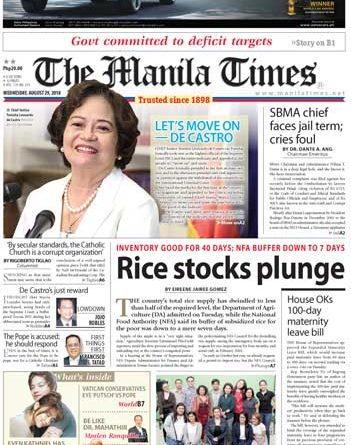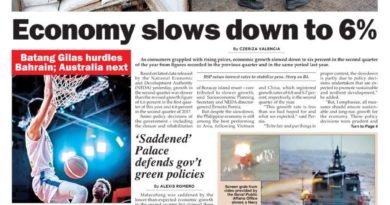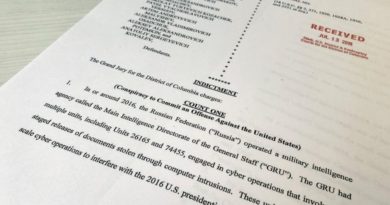ASEAN NEWS STAND HEADLINES: INVENTORY GOOD FOR 40 DAYS: MANILA – NFA BUFFER DOWN TO 7 DAYS Rice stocks plunge
THE country’s total rice supply has dwindled to less than half of the required level, the Department of Agriculture (DA) admitted on Tuesday, while the National Food Authority (NFA) said its buffer of subsidized rice for the poor was down to a mere seven days.
Supply of the staple is in a “very tight situation,” Agriculture Secretary Emmanuel Piñol told reporters, amid the slow process of importing and unloading rice at the country’s congested ports.
In a hearing at the House of Representatives, NFA Deputy Administrator for Finance and Administration Tomas Escarez pointed the finger to the policymaking NFA Council for the dwindling rice supply, saying the interagency body sat on a request for rice importation for four months, and acted only in February 2018.
“As early as October last year, we already requested a permit to import rice, but the NFA Council, after so many months, did not act on it, resulting in higher price of rice. The NFA Council always says that the private sector can take care of it (rice supply). And so, the imported rice only arrived in June. Our request was for one million metric tons,” Escarez told lawmakers.
“But our mandate is to have 15 days of buffer stock and 30 days during lean months. Now, we only have seven days [of buffer stock],” Escarez added.
The national inventory stood at 1,320,927 metric tons (MT), good for only 40 days, and significantly lower than the supposed 90-day national buffer stock requirement, Piñol said.
This does not include imported rice under the minimum access volume (MAV) scheme, he said.
Under the Food Staples Sufficiency Program, the entire country should have a 60-day inventory at any given time, and a 90-day buffer stock during lean months.
Supply to stabilize in Nov
Piñol said the 805,000 MT of rice imports allowed by the government under the MAV scheme were supposed to be completed by September 15. Only 168,000 MT have been unloaded as of the third week of August.
“The traders and porters have appealed that this be extended to September 30 because they had a hard time looking for vessels to bring their stocks to the country due to congestion at the ports,” the Cabinet official said.
Rice traders also wanted government help in facilitating the unloading of rice from Vietnamese and Thai vessels, “so that the rice stocks could be delivered to the market right away.”
Piñol said consumers could expect rice prices and an adequate supply of the staple to stabilize by November.
Still, the retail price of regular well-milled rice should start at P40 per kilo, Piñol said, urging government agencies to strengthen their price monitoring.
Finger-pointing
At the House, lawmakers chided the NFA and the NFA Council for finger-pointing.
Trade Undersecretary Ruth Castelo said the council’s issuance of an importation permit was delayed because the NFA failed to submit its inventory to the NFA council.
She said NFA Administrator Jason Aquino’s statement on January 25 that there were no more NFA rice stocks drove prices up.
“They did not submit the inventory, and we should also remember that the NFA only supplies 5 percent of the rice supply of the country. The rest accounts for commercial rice and household rice. The NFA is just there to stabilize the rice prices when there is not enough rice in the market,” Castelo said.
This did not sit well with Escarez, who was adamant that the NFA should not be faulted for rising rice prices.
“This is not our fault. Inventory? Journalists are coming to our office every day, and we tell them that we only have a buffer stock for five days. They (NFA Council) knew the situation. Besides, we have records of our meetings where we told the same thing to them,” Escarez said.
Deputy Speaker Prospero Pichay of Surigao del Sur sided with Escarez.
“Do you people [at the NFA Council]really need that much time to evaluate a request for rice import? Rice is very vital for our food security. Do you need an algorithm for that? Why does it take you so long?” Pichay said.
Castelo responded by saying, “I will relay it to the council, your Honors.”
Sen. Cynthia Villar, chairman of the Senate Committee on Agriculture and Food, proposed price controls.
“Because they (NFA officials) have failed in their mandate, why don’t we just put price control on rice?” she told reporters in the Senate. “Or it would be better if they declared a state of calamity and impose price control on rice.”
Sen. Francis Pangilinan said NFA officials should explain the alleged “diversion of rice stocks that drove prices up in some parts of Mindanao.”
“With the arrival of imported rice, why hasn’t the supply stabilized? Sadly, our food officials have not lived up to the task,” he said.
WITH LLANESCA T. PANTI AND BERNADETTE E. TAMAYO
ASEAN NEWS STAND HEADLINES:






.
 All photographs, news, editorials, opinions, information, data, others have been taken from the Internet..aseanews.net | [email protected] / For comments, Email to : Aseanews.Net |
All photographs, news, editorials, opinions, information, data, others have been taken from the Internet..aseanews.net | [email protected] / For comments, Email to : Aseanews.Net |









